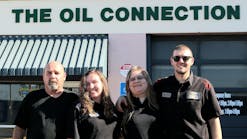It’s important for an owner to understand how to navigate the different personalities and backgrounds incorporated into a multi-generational workplace.
“[Millennials] bring so much experience to the table, yet people think, ‘Well, they’ve got the experience, but they’re not willing to change,’ which is not true,” says Elaine Dumler, a communication strategist.
With regards to the technicians that have been in the industry for over 20 years, Dumler denounces a classic stereotype that “old dogs won’t learn new tricks.”
Dumler is a communication strategist and started her communication company, Frankly Speaking, in 1989 to help companies increase their internal or external communication strategies.
The quick lube industry is fast-paced and always evolving. Technicians at any age should acquire basic skills and values that will never be outdated and continue their education throughout a career.
Dumler says the primary values at the root of running a healthy, multi-generational workplace are the willingness to learn, understanding, and respect for each other. For operators, these core values can be the start to a healthy work environment for all levels of experience.
Before You Start: Setting a Schedule
Navigating different generations in a shop can be difficult. However, increasing communications between the staff will increase multi-generational collaboration. Shops may do this in many ways, but here’s how one has done it successfully.
Operator Bill Floyd, along with daughter and operations manager April Maxey, run Lucas Oil Center smoothly by making sure everyone is on the same page. Over the past few years, they have cultivated a healthy work environment.
They have meetings once per month with the managers of their two locations. Additionally, twice per year, they get the entire 35-person staff together to go over the past six months and set goals for the next six.
The two locations have implemented morning meetings on Mondays to discuss what work they have to complete that week, and they reconvene on Fridays to go over the week.
Value 1: Willingness to Learn
The biggest challenge to cultivating a workplace with multi-generational collaboration is when employees, on both sides of the spectrum, feel they don’t have to learn anything new. That could range from new technology or new methods to complete a task more efficiently.
Dumler says the older generations of technicians learned how to work in this industry at a different time and the shift of the younger generation of technicians adds a new dynamic to the workplace.
“What I’ve seen change over the years, and what I like about this demographic is they’re not fenced in quite as heavily by tradition,” says Dumler.
The younger, less experienced technicians are more impressionable when it comes to learning a new technique or skill because they aren’t held down by tradition.
She has conducted communication workshops which have helped shops and individuals shift from this negative mindset, into a positive mindset of thinking about how processes can be improved.
If a shop is struggling to get everyone on the same page, Dumler suggests a half-day communication workshop. A company should bring in the entire staff to collectively agree on some common goals that will increase multi-generational collaboration and then a few steps to achieve the goals.
Value 2: Mechanics and Technology
At Lucas Oil Center, Floyd and Maxey observed their diverse staff and noticed that the older employees understand the mechanics of the machines on which they work. The technicians with over 20 years of experience were taught their trade in a time before all the new technology.
The newer people in the industry understand the new technology that is being put into vehicles. They say many of their new, young technicians go to school and learn the new tech in class curriculums.
For the shop, it has been a win-win for their work’s efficiency and environment. They say the older generation wants to teach the younger technician—and vice versa.
Lucas Oil Center has spent years cultivating a work environment that enables this collaboration between everyone on the team. The different generations bring different expertise and skills to the team, and are willing to share and learn from each other.
Value 3: Training
Floyd and Maxey say getting new, young technicians in the industry can be helpful because their techniques can be molded to their shop’s processes.
“We have found that we really need to have very accurate procedures and documentation to continue to program them,” says Floyd.
That repetition of those procedures helps employees retain how to complete a task efficiently. The streamlining of their day-to-day processes has guaranteed consistency for the employees to learn and retain the procedure over time.
Also, they value investing in online learning programs from the Automotive Oil Change Association for their employees to further any educational courses they need.
However, Floyd says everybody needs hands-on training to not just learn how tasks are done, but also why they are done. Floyd has held pizza and learning events after hours, during which vendors came into the shop to teach all their technicians about new technology.
Dumler says this is the perfect environment to increase workplace camaraderie between different generations because everyone comes together in a low pressure situation to learn.
Value 4: Understanding
One of Dumler’s favorite tools to bridge communication gaps between coworkers’ points of view is the phrase, “help me understand.”
Miscommunications are not uncommon in the workplace, so facilitating a work environment that supports the ability to ask questions for clarifications is important in the workplace.
Dumler says the largest aspect of understanding is to improve listening skills. Understanding and a willingness to learn from someone who might know more than you are important qualities for technicians to have.
Floyd and Maxey say their diverse team has different strengths and weaknesses. Their younger technicians understand the electronics of the work, but they have to teach younger employees customer service skills or how to answer the phone.
From a management perspective, understanding the strengths and weaknesses of the team will allow an owner to fill the gaps or provide training to employees that need help in an area of the job.
Value 5: Respect
“We look at all generations as extremely important in the day to day processes and in our hiring process. We find value in all of the different generations that we have working for us,” says Maxey.
At Lucas Oil Center, company leaders have spent years understanding the unique skill sets that different generations bring into the shop. The root of helping better coworkers and employees is showing them respect for the skills they add to the team.
Efficiency is a primary goal for body shops, but efficiency relies on how well employees work together and implement change that will streamline processes. Respect should be at the root of any shop culture, from boss to employee or employee to employee.
Dumler suggests a few ways technicians can go about helping or teaching their coworkers from different age groups.
She says to observe their work, then approach them and praise their work initially, but then suggest a way that can be more efficient. It goes both ways, but younger and older generations of technicians should want to better processes in the shop.
Everyone in a shop has valuable skills to learn and teach one another respectfully. New innovations or understanding the mechanics under the hood will facilitate that healthy environment of multi-generational collaboration.





